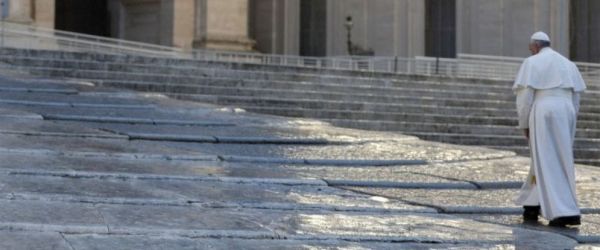The Gospel of today’s Liturgy recounts a brief dialogue between Jesus and the Apostle John, who speaks on behalf of the entire group of disciples. They saw a man who was casting out demons in the name of the Lord, but they stopped him because he was not part of their group. At this point, Jesus invited them not to hinder those who do good, because they contribute to the fulfilment of God’s plan (cf. Mk 9:38-41). Then he admonished them: instead of dividing people into good and bad, we are all called to be vigilant over our own hearts, lest we succumb to evil and bring scandal to others (cf. vv. 42-45, 47-48).
In short, Jesus’ words reveal a temptation, and offer an exhortation. The temptation is to be “closed off”. The disciples would like to hinder a good deed simply because it is performed by someone who does not belong to their group. They think they have the “exclusive right over Jesus”, and that they are the only ones authorised to work for the Kingdom of God. But this way, they end up feeling that they are privileged and consider others as outsiders, to the extent of becoming hostile towards them. Brothers and sisters, every closure tends in fact to keep us at a distance from those who do not think like we do, and this — we know — is the root of many great evils in history: of absolutism that has often generated dictatorships and of great violence towards those who are different.
But we need to be vigilant about closure in the Church too. Because the devil, who is the divider — this is what the word “devil” means, the one who divides — always insinuates suspicions to divide and exclude people. He tempts by using cunning, and it can happen as with those disciples, who ended up excluding even someone who had cast out the devil himself! Sometimes we too, instead of being humble and open communities, can give the impression of being the “top of the class” and keep others at a distance; instead of trying to walk with everyone, we can show off our “believer’s license”: “I am a believer”, “I am Catholic”, “I belong to this association, to that one”, and the others, poor things, do not. This is a sin. Showing off one’s “believer’s license” to judge and exclude. Let us ask for the grace to overcome the temptation to judge and to categorise, and may God preserve us from the “nest” mentality, that of jealously guarding ourselves in the small group of those who consider themselves good: the priest with his loyal followers, the pastoral workers closed off among themselves so that no one can infiltrate, the movements and associations in their own particular charism, and so on. Closed. All this runs the risk of turning Christian communities into places of separation and not of communion. The Holy Spirit does not want closure; He wants openness, welcoming communities where there is a place for everyone.
[Pope Francis, Angelus 26 September 2021]












